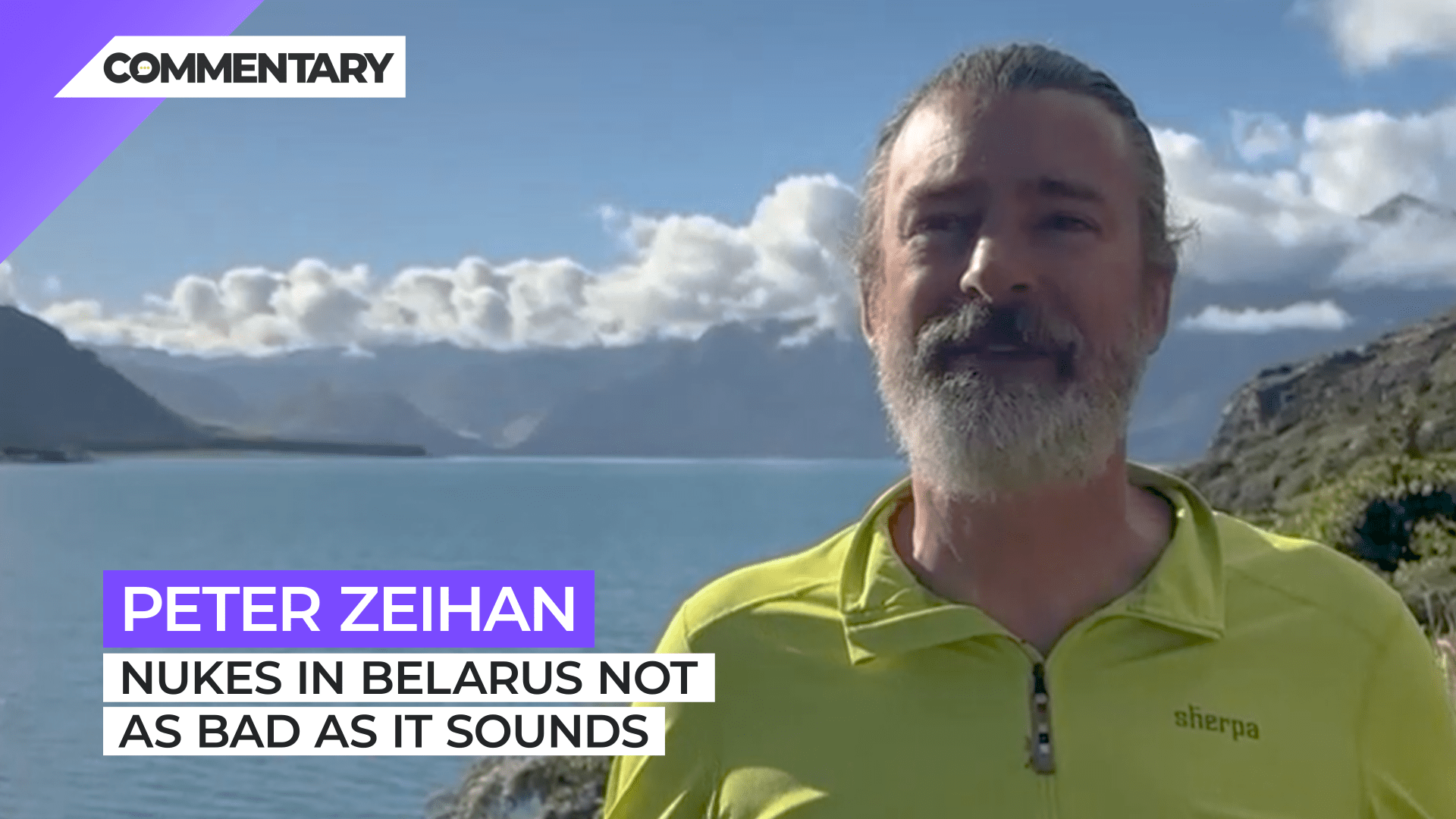
Commentary
-
Our commentary partners will help you reach your own conclusions on complex topics.
Hey everybody, Peter Zeihan here coming to you from the shores of Lake how we it’s the famed Dingle burn arm behind me, this is my favorite lake in New Zealand for the obvious reasons. And today we’re talking about Russia and nukes. So for those of you who have not been under a rock, the Russians have been threatened in nuclear this and that and everything since the Ukraine war started. But if you’ve looked back and look at the statements, you’ll know that sometime in mid March of last year, Putin stopped making threats. And it was only in the last couple of weeks that the Russians have said they’re moving nukes up to permanent station in Belarus, which is the first expansion of the Russian military footprint in terms of nuclear arms. Since the end of the Cold War, a lot of people are worried about that. But I think it’s best to look back before we look forward. So if you remember back to February and early March, Putin was making nuclear threats against anyone who was willing to support the Ukrainians in any way. And then he just stopped. And the way it was explained to me the last time I was in Washington, when something like this, that the ambassador was dispatched to talk to Putin, and to lay out a little bit of logic. And the idea was that if you look back to February and March, especially in January, when the Russians would have a super secret meeting with the National Security Council in a locked room, and then within hours, the transcript of those conversations would be published in Western media, the way the ambassador explained it to Putin was that the Americans had been listening to everything, every phone call every conversation, reading every email, and in doing so have a full picture of everything that Putin was personally considering and within his inner circle. And the idea was that, you know, a minor detail of this sort of espionage was that the United States knew at any given time, physically where Putin was. So if he thought he could fling a nuke into the Western Hemisphere in the first couple wouldn’t just come back and come right down his throat, he was kind of out of his mind. So he stopped making the threats, and he left it to his henchmen to do it. This new development is kind of in the same vein, putting nukes in a place doesn’t in of itself, change your military posture. And we know from some of the nuclear threats that the Russians made back in last March and April and May, is that they didn’t actually change their readiness, they were just shouting. This is kind of like that. Because if you put a nuke in another country, you need a hardened facility, you need a command and control system, you need an IT system that is absolutely hack proof. And putting that in Belarus, Belarus barely has electricity on a good day. It’s a horrible place for nuclear base. So if the Russians did transfer nukes there, they’d basically been sitting in crates surrounded by soldiers unable to be launched. So at this point, and this specific issue, the nuclear threat coming out of Russia has not actually increased. The potential risk we have here is proliferation because we know that the Russians don’t have security. And we know that the military has become really corrupt, especially when it comes to hardware and funding. So taking secure nuclear materials and transferring them to a country that’s a kleptocracy like Belarus actually raises the chance that these things might get sold on the open market. It’s not that that’s a non risk, but it’s a very, very different risk from the idea of the Russians actually physically expanding their nuclear deployment footprint. But in terms of operational readiness, there’s really no change because the Russians already have a nuclear footprint in their little enclave of Kaliningrad on the Baltic Sea, which is west of Belarus. So nothing has really changed here. The Russians are just looking for a little way to beat their chests and kind of feed the domestic nationalism machine that is keeping the government in power. This is about internal Russian politics, not international security issues, at least for now. All right, that’s it for me. Talk to you guys later.
-
Hurricane Helene hits US coast, Appalachia and beyond
Hurricane Helene hit Florida and Georgia overnight between Sept. 26 and 27 as a Category 4 hurricane, and accompanying storms will continue reaching deeper into the continental United States today. Dangerous flash flooding from the hurricane, known as storm surge, was some of the worst flooding that the Tampa Bay area has ever seen, and… -
Israel holds upper hand against Lebanon, Hezbollah and Iran
On Wednesday, Sept. 25, Hezbollah launched a ballistic missile at Tel Aviv in retaliation for Israel’s explosive pager attack that blew up devices across Lebanon. Although Israel’s defense systems intercepted the surface-to-surface missile, the attempted strike on Tel Aviv marked a significant escalation by Hezbollah. Since the siege on Gaza began, shortly after the Oct. 7, 2023,… -
The Sinaloa Cartel civil war
Fears of a civil war within the Sinaloa Cartel are growing as violence between competing factions within the cartel continues. The Mexican Army has dispatched around 600 elite troops to Sinaloa to help quell those fears, in addition to roughly 2,200 regular soldiers and National Guard. Watch the above video as Straight Arrow News contributor… -
New Ukrainian weapons hit Russia where it hurts
Ukrainian drones struck a major Russian ammunition depot, triggering a massive explosion that was captured on camera. According to the Ukrainian military, 2,000 tons of munitions had arrived at the depot before the attack. Over the past two years, Ukraine has significantly increased its domestic drone production, allowing it to scale up attacks on military… -
Weighing social costs vs. economic benefits on immigration
Global human migration is one of the defining elements of our current historical era, according to the United Nations. Migrants face both the incentives to leave — forced out by climate change, crime and corruption, extreme poverty or violence — and incentives for where to go, based on available job opportunities and so on. Migration…
Latest Stories
-
 Getty Images
Getty Images
Hochul says Robert Brooks beating was a homicide
-
 Getty Images
Getty Images
Curry on Warriors trade for Jimmy Butler: ‘It will look different’
-
 AP Images
AP Images
Colombian president wants cocaine legalized, says ‘no worse than whiskey’
-
 Getty Images
Getty Images
Nonprofit renews push to restore neighborhood after Tulsa Race Massacre
-
 Reuters
Reuters
DOJ accuses FBI of ‘insubordination’ for not submitting Jan. 6 agents’ info: Report
Popular Opinions
-
In addition to the facts, we believe it’s vital to hear perspectives from all sides of the political spectrum.
Latest Opinions
In addition to the facts, we believe it’s vital to hear perspectives from all sides of the political spectrum. We hope these different voices will help you reach your own conclusions.
The opinions published in this section are solely those of the contributors and do not reflect the views of Straight Arrow News.





















Latest Commentary
We know it is important to hear from a diverse range of observers on the complex topics we face and believe our commentary partners will help you reach your own conclusions.
The commentaries published in this section are solely those of the contributors and do not reflect the views of Straight Arrow News.
Dr. Frank Luntz
Pollster and Political Analyst‘A promise’: Cadets describe their journeys at West Point
‘A disturbing pick’: Americans debate Musk, Trump’s cabinet picks
‘Dysfunctional’: Americans share criticisms of Congress